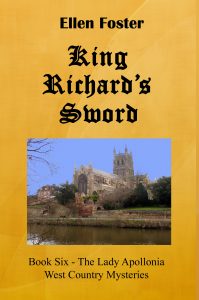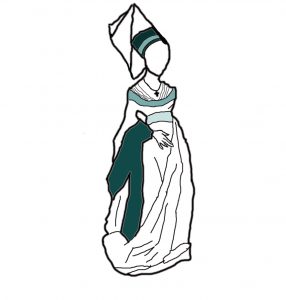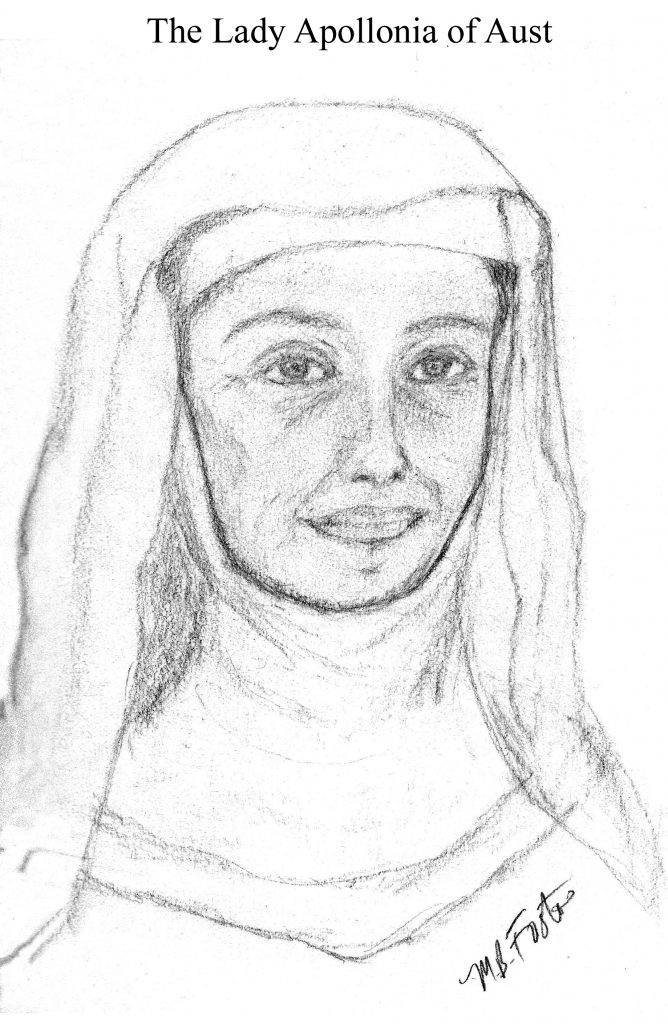 Greetings! Thanks for joining us as we finish examining topics which arise in King Richard’s Sword, the sixth book in my Lady Apollonia West Country Mysteries.
Greetings! Thanks for joining us as we finish examining topics which arise in King Richard’s Sword, the sixth book in my Lady Apollonia West Country Mysteries.
Each of my books has a glossary to define medieval terms which may be unfamiliar to the modern reader or had different meanings than in the present time. For example, chivalry is defined as “Rules and ideal qualifications of a medieval knight: courage, courtesy, generosity, valour and dexterity in arms.”
In turn, courtesy “In the understanding of those followers of Julian of Norwich from about 1400, is not meant to be understood as excellence of manners or polite behaviour. Courtesy means loving respect implying not only indulgence of another but also goodness granted freely regardless of sinful behaviour. Mother Julian describes God as our ‘Courteous Lord’”. As you can see, the medieval word “courtesy” had connotations beyond Emily Post and others influencing our manners. A drawing of my heroine, the Lady Apollonia of Aust who is a fan of Mother Julian, is shown on the lower right.
Lady Apollonia is described as a vowess in several of my novels. This vocation is the choice she makes after having been widowed a third time, as described in Templar’s Prophecy, set in 1395, and in my novels which are set later, such as King Richard’s Sword. In the glossary, vowess is defined as “A ceremony performed before witnesses during mass where a kneeling widow was asked by the bishop if she desired to be a spouse of Christ. The vow was restricted to the obligation of perpetual chastity and in no way curtailed the activities of the vowess. She was able to remain in the world and not be confined to a monastic life.”
The motivation for Apollonia to become a vowess included several aspects of the definition. By becoming a spouse of Christ, she was able to protect herself from another marriage. As a wealthy widow, she was vulnerable to being involuntarily grabbed by a powerful man to be his wife, simply for her money. By remaining single, she retained her independence and control of her many assets. The Lady was a devout Christian, but being a vowess did not require her to go into a convent. Therefore, she could remain in the world and deal with various mysterious problems that came her way. A drawing of Lady Apollonia as a vowess appears at the end of this blog post.
 “Gangs” is another term that occurs in many of my novels, including King Richard’s Sword. It is not in my glossary, for in modern life, criminal gangs have been a major problem yet have not been a problem just for our day. Gangs were also a threatening part of medieval life in England. We are all aware of the Robin Hood stories from the medieval period with their romantic plots of robbing the rich and helping the poor. Gangs may have inspired some of the Robin Hood tales, but the reality more frequently was that medieval gangs in England performed their criminal acts for their own benefit and often these gangs were led by noble persons and others of exalted position.
“Gangs” is another term that occurs in many of my novels, including King Richard’s Sword. It is not in my glossary, for in modern life, criminal gangs have been a major problem yet have not been a problem just for our day. Gangs were also a threatening part of medieval life in England. We are all aware of the Robin Hood stories from the medieval period with their romantic plots of robbing the rich and helping the poor. Gangs may have inspired some of the Robin Hood tales, but the reality more frequently was that medieval gangs in England performed their criminal acts for their own benefit and often these gangs were led by noble persons and others of exalted position.
So, I have used the idea of gangs in many of my novels, including King Richard’s Sword where I have used a disreputable monk leading a gang. Two of the worst villains in my series are female gang leaders but I have even employed competing gangs in the same story. This use of gangs in my stories is not out of line with the actual history of medieval England.
